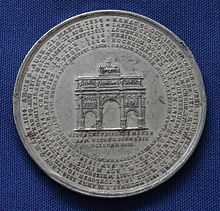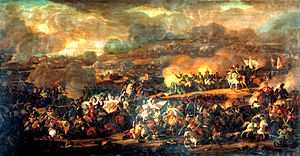German campaign (Napoleonic Wars)




The German Campaign (Ger. Befreiungskriege) was the campaign which ended the War of the Sixth Coalition, itself part of the Napoleonic Wars. It took place in Germany after Napoleon's retreat from Russia. In Germany itself it became known as the Befreiungskriege (Wars of Liberation) or Freiheitskriege (Wars of Freedom) - both terms were used at the time, both by liberals and nationalists in terms of a unified and democratic Germany and by conservatives after the Bourbon Restoration to mean freeing Europe from French hegemony and occupation. It is also known as the europäische Befreiungskriege (European Wars of Liberation), to distinguish it from the 1808 Spanish Uprising.
Context
Since 1806 writers and intellectuals such as Johann Philipp Palm, Johann Gottlieb Fichte, Ernst Moritz Arndt, Friedrich Ludwig Jahn and Theodor Körner had been criticising the Napoleonic occupation of Germany. They advocated limitations to the dynastic princes of Germany and a joint effort by all Germans to eject the French. From 1810 Arndt and Jahn asked high-ranking figures in Prussian society again and again to prepare such an uprising. Jahn himself organised the German League and made a major contribution to the founding of the Lützow Free Corps. These forerunners took part in the outbreak of hostilities in Germany, both by serving in the armed forces and by backing the Coalition forces through their writings.
Even before the German Campaign, there had been uprisings against the French troops occupying Germany - these had broken out from 1806 onwards in Hesse and in 1809 in the Tyrolean Rebellion. These uprisings intensified in the same year under Wilhelm von Dörnberg, the initiator and commander-in-chief of the Hessian uprising, and Major Ferdinand von Schill.
Course
After the devastating defeat of Napoleon's Grande Armée in Russia in 1812, Ludwig Yorck von Wartenburg - the general in command of the Grande Armée's German auxiliaries (Hilfskorps) - declared a ceasefire with the Russians on 30 December 1812 via the Convention of Tauroggen. This was the decisive factor in the outbreak of the German Campaign the following year.
On 17 March 1813 - the day Alexander I of Russia arrived in the Hoflager of Frederick William III of Prussia - Prussia declared war on France. On 20 March 1813 the Schlesische privilegierte Zeitung newspaper published Frederick's speech entitled An Mein Volk, delivered on 17 March and calling for a war of liberation. In addition to newly formed Prussian units such as the Landwehr and Landsturm, the initial fighting was undertaken by volunteers such as German volunteer troops and Jäger and Free Corps (such as the Lützow Free Corps) and the soldiers of Russia and (from summer 1813 onwards) Sweden under Crown Prince Charles John (the former French marshal Bernadotte) and Austria under field marshal Schwarzenberg. Already busy with maintaining naval supremacy and fighting the Peninsular War, Great Britain did not take any direct part in the German campaign, though it sent subsidies to support it.
Via the Trachenberg Plan, developed during a period of ceasefire in the summer of 1813, the ministers of Prussia, Russia and Sweden agreed to pursue a single allied strategy against Napoleon. Austria eventually sided with the coalition, thwarting Napoleon's hopes of reaching a separate agreement with the major powers Austria und Russia. The allies now had a clear numerical superiority, which they eventually brought to bear on Napoleon's main forces, despite earlier setbacks as in the Battle of Dresden. The high point of allied strategy was the Battle of Leipzig in October 1813, which ended in Napoleon's decisive defeat. The Confederation of the Rhine, an alliance of west German rulers allied to France, had already lost battles against the Allies in Bavaria and Saxony and after the defeat at Leipzig dissolved completely. This completely broke Napoleon's power to the east of the river Rhine. The German campaign's final phase took place in the early months of 1814, coinciding with the Duke of Wellington's march up through southern France and ending in Napoleon's abdication and the Treaty of Paris.
Results
The campaign ended the 'French period' (Franzosenzeit) in Germany and fostered a new sense of German unity and nationalism. The German Confederation, formed at the Congress of Vienna in 1815, was a precursor to the modern German nation state, which was, however, only realized more than half a century later under Prussian leadership. The popular image of the campaign in Germany was shaped by the cultural memory of its veterans, especially the many students who volunteered to fight in the Lützow Free Corps and other units who later rose to high positions in the military and political spheres. A new boom in remembrance of the war occurred in 1913, on the centenary of its outbreak.
See also
References
Notes
Bibliography
- In English
- Lüke, Martina (2009). Anti-Napoleonic Wars of Liberation (1813-1815). In: The International Encyclopedia of Revolution and Protest: 1500-present. Edited by Immanuel Ness. Malden, MA: Wiley-Blackwell. pp. 188–190.
- In German
- Lars Beißwenger: Der Befreiungskrieg von 1813. In: Josef J. Schmid (Hrsg.): Waterloo – 18. Juni 1815. Vorgeschichte, Verlauf und Folgen einer europäischen Schlacht Verlag nova & vetera, Bonn 2008, ISBN 978-3-936741-55-1, (Studia academica historica 1), S. 85–142.
- Christopher Clark: Preußen. Aufstieg und Niedergang. 1600 - 1947. 6. Auflage. DVA, München 2007, ISBN 978-3-421-05392-3.
- Ewald Grothe: Befreiungskriege. In: Friedrich Jaeger (Hrsg.): Enzyklopädie der Neuzeit. Band 1: Abendland - Beleuchtung. Metzler, Stuttgart u. a. 2005, ISBN 3-476-01991-8, Sp. 1139–1146.
- Karen Hagemann: „Mannlicher Muth und Teutsche Ehre“. Nation, Militär und Geschlecht zur Zeit der antinapoleonischen Kriege Preußens. Schöningh, Paderborn u. a. 2002, ISBN 3-506-74477-1, (Krieg in der Geschichte 8), (Zugleich: Berlin, Techn. Univ., Habilschrift, 2000).
- Heinz Helmert, Hans-Jürgen Usczek: Europäische Befreiungskriege 1808-1814/15. Militärischer Verlauf. Militärverlag der Deutschen Demokratischen Republik, Belin 1976, (Kleine Militärgeschichte: Kriege).
- Eckart Kleßmann (Hrsg.): Die Befreiungskriege in Augenzeugenberichten. Lizenzausgabe. Ungekürzte Ausgabe. Deutscher Taschenbuch-Verlag, München 1973, ISBN 3-423-00912-8, (dtv 912 Augenzeugenberichte).
- Horst Kohl: Blüchers Zug von Auerstedt bis Ratkau und Lübecks Schreckenstage (1806). Quellenberichte. Neuauflage der Erstausgabe von 1912. Bearbeitet von Carola Herbst. Godewind Verlag, Wismar 2006, ISBN 3-938347-16-3.
- Märsche und Balladen aus den Freiheitskriegen 1813-1815. Studios Berlin-BRIO-Musikverlag, Berlin 2009, (CD).
- Golo Mann: Die Geschichte des 19. und 20. Jahrhundert. Hamburg 1966.
- Carl Mönckeberg: Hamburg unter dem Drucke der Franzosen 1806-1814. Historische Denkwürdigkeiten. Reprint der Ausgabe Hamburg, Nolte, 1864. Godewind Verlag, Wismar 2006, ISBN 3-938347-66-X.
- Hermann Müller-Bohn: Die Deutschen Befreiungskriege 1806-1815. Erstes Buch: Unter französischem Joche. Veränderte Neuauflage. Bearbeitet von Hans J. Herbst. Godewind Verlag, Wismar 2006, ISBN 3-939198-77-3.
- Ute Planert: Der Mythos vom Befreiungskrieg. Frankreichs Kriege und der deutsche Süden. Alltag – Wahrnehmung – Deutung 1792-1841. Schöningh, Paderborn u. a. 2007, ISBN 978-3-506-75662-6, (Krieg in der Geschichte 33), (Zugleich: Tübingen, Univ., Habilschrift, 2003/04).
External links
| Wikimedia Commons has media related to Befreiungskriege. |
- Bogdanovich Modest I. (1863) (in Russian). History of the War in 1813 for the independence of Germany (История войны 1813 года за независимость Германии) at Runivers.ru in DjVu and PDF formats
- (German) Collection of historical eBooks about the War of the Sixth Coalition
- (German) Befreiungskriege on BAM-Portal
- (German) »Leipzigs Drangsale« on EPOCHE NAPOLEON
- (German) Complete online facsimile of a diary of 1813
- (German) Die Eiserne Zeit – picture gallery on the German Campaign
- (German) Battle of Leipzig
- (German) Online literature on the German campaign 1806=15
- (German) Zur Hundertjahrfeier 1813-1913. Raphael Tuck's postcard series 932
| ||||||||||||||||||||||||||||||||||||||||||||||||||||||||||||||||||||||||||||||||||||||||||||
